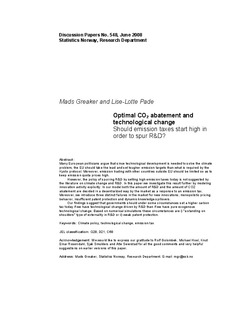| dc.contributor.author | Greaker, Mads | |
| dc.contributor.author | Pade, Lise-Lotte | |
| dc.date.accessioned | 2011-11-05T14:58:32Z | |
| dc.date.available | 2011-11-05T14:58:32Z | |
| dc.date.issued | 2008 | |
| dc.identifier.issn | 1892-753x | |
| dc.identifier.uri | http://hdl.handle.net/11250/180597 | |
| dc.description.abstract | Abstract:
Many European politicians argue that since technological development is needed to solve the climate problem, the EU should take the lead and set tougher emission targets than what is required by the Kyoto protocol. Moreover, emission trading with other countries outside EU should be limited so as to keep emission quota prices high. However, the policy of spurring R&D by setting high emission taxes today is not suggested by the literature on climate change and R&D. In this paper we investigate this result further by modeling innovation activity explicitly. In our model both the amount of R&D and the amount of CO2 abatement are decided in a decentralized way by the market as a response to an emission tax. Moreover, we introduce three distinct failures in the market for new innovations; monopolistic pricing behavior, insufficient patent protection and dynamic knowledge spillovers. Our findings suggest that governments should under some circumstances set a higher carbon tax today if we have technological change driven by R&D than if we have pure exogenous technological change. Based on numerical simulations these circumstances are i) "a standing on shoulders" type of externality in R&D or ii) weak patent protection.
Keywords: Climate policy, technological change, emission tax
JEL classification: Q28, D21, C68 | no_NO |
| dc.language.iso | eng | no_NO |
| dc.publisher | Statistics Norway, Research Department | no_NO |
| dc.relation.ispartofseries | Discussion Papers;No. 548 | |
| dc.subject | Climate policy | no_NO |
| dc.subject | Emission tax | no_NO |
| dc.subject | Technological changes | no_NO |
| dc.subject | Klimapolitikk | no_NO |
| dc.subject | Miljøavgifter | no_NO |
| dc.subject | Miljøpolitikk | no_NO |
| dc.subject | JEL classification: Q28 | no_NO |
| dc.subject | JEL classification: D21 | no_NO |
| dc.subject | JEL classification: C68 | no_NO |
| dc.title | Optimal CO2 abatement and technological change : should emission taxes start high in order to spur R&D? | no_NO |
| dc.type | Working paper | no_NO |
| dc.subject.nsi | VDP::Social science: 200::Economics: 210::Economics: 212 | no_NO |
| dc.source.pagenumber | 22 s. | no_NO |
